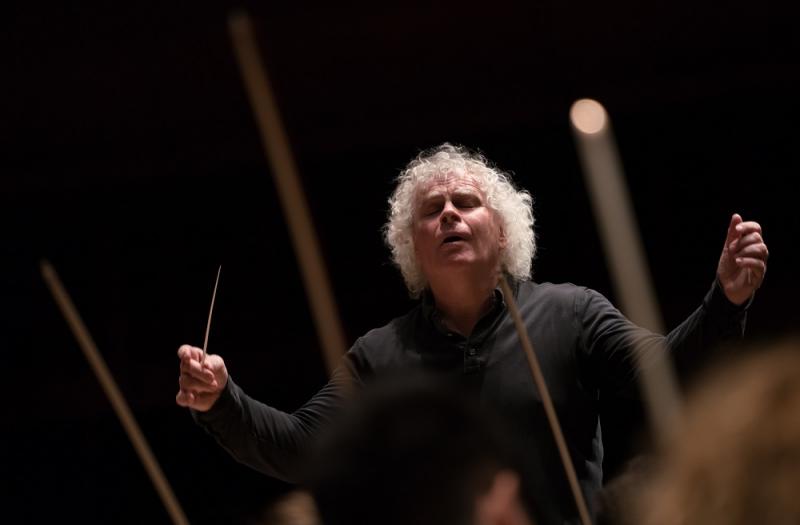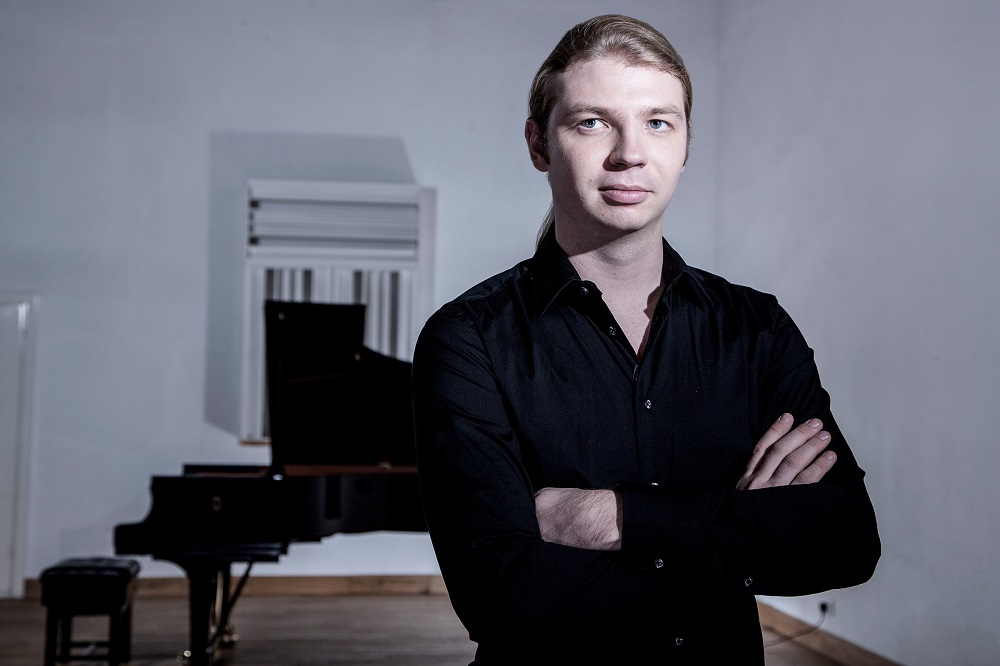Kozhukhin, LSO, Rattle, Barbican | reviews, news & interviews
Kozhukhin, LSO, Rattle, Barbican
Kozhukhin, LSO, Rattle, Barbican
A self-love scene, a rehearsal-level concerto and weird Haydn don't quite add up

Gorgeous sound, shame about the movement – or lack of it. That seems to be the problem with too many of Simon Rattle's interpretations of late romantic music.
It's often been said that Rattle is a micro-manager, drawing extraordinary sounds out of his Berlin and London players but fussing too much with the line to ever give a sense of the whole. The effects-master was well matched to his curious selection of Haydn at his most innovatory. There was too much minor storm or sobriety for the first chunk of this "Haydn experience", and the Largo of Symphony No 64 seemed more stop-start than startling. But then the real cornucopia unfolded with the plethora of solos in the Minuet and Trio of the Sixth ("Le Matin") Symphony, the brio and fun of finales long and short – and the famous "Farewell".
It was odd that this was the one orchestral movement Rattle chose to tell us about in his short spoken introduction, and sure enough it's a wonderful story about getting your revenge on your patron for having made the court players stay on without their families for too long, simply by getting them to leave one by one. But wouldn't many members of the audience have benefitted from a wonderful surprise? Anyway, it worked, with the main lights dimmed and those on the music stands switched off one by one. Clever, too, to follow it with a discreet Ives-style melange of musical chimes at midnight (Haydn wrote no less than 60 original melodies for "flute clocks" around the Esterhazy palace – as a reader clarifies below, the finale of the "Lark" Quartet was arranged as one of them). The players' return for the finale of Symphony No 90 with its false conclusion – Rattle added another with a repeat – may have been a homage to Schnittke's First Symphony, where the players exit the stage only to come back on before the end. Yes, it was fun, albeit of a slightly self-conscious sort. Better, perhaps, to have turned this into a lecture-concert; better still to have given us two complete Haydn symphonies, for there are extraordinary things in every one; I think I learnt more, and enjoyed it, when the Scottish Chamber Orchestra played "Le Matin," "Le Midi" and "Le Soir" in sequence, or when Yannick Nézet-Séguin unfolded wonders in three of the best with the Orchestra of the Age of Enlightenment.
The players' return for the finale of Symphony No 90 with its false conclusion – Rattle added another with a repeat – may have been a homage to Schnittke's First Symphony, where the players exit the stage only to come back on before the end. Yes, it was fun, albeit of a slightly self-conscious sort. Better, perhaps, to have turned this into a lecture-concert; better still to have given us two complete Haydn symphonies, for there are extraordinary things in every one; I think I learnt more, and enjoyed it, when the Scottish Chamber Orchestra played "Le Matin," "Le Midi" and "Le Soir" in sequence, or when Yannick Nézet-Séguin unfolded wonders in three of the best with the Orchestra of the Age of Enlightenment.
Perhaps too much preparation time went on this; the Bartók Second Piano Concerto before the interval sounded more like a rehearsal than a performance, and not nearly wild enough. Kozhukhin (pictured above by Paul Marc Mitchell) had plenty of light-touch ideas of his own about how this powerhouse should go, though the buzzing, chord-clustered Presto flanked by the Adagios of the second movement – their genuine pianissimos the most successful part of the performance – seemed over-cautious.
As was Rattle's conducting of the LSO throughout. Maybe this was a result of being sure to follow Kozhukhin, stepping in for an indisposed Lang Lang, whom for once I'd actually like to have heard in a work where he couldn't indulge his tendency to pull lines about. But you did tend to think "what a difficult work" rather than "what a masterpiece", and the playing wasn't the LSO's finest: one trumpet phrase went haywire and another blasted in too early. No doubt about it, though, the LSO soloists are in better than ever shape generally; in the Tristan Prelude first oboist Olivier Stankiewicz made the fullest-toned sound I've ever heard from an orchestral principal, and the texturing was impeccable. It was just a shame about the whole.
rating
Share this article
Add comment
The future of Arts Journalism
You can stop theartsdesk.com closing!
We urgently need financing to survive. Our fundraising drive has thus far raised £49,000 but we need to reach £100,000 or we will be forced to close. Please contribute here: https://gofund.me/c3f6033d
And if you can forward this information to anyone who might assist, we’d be grateful.

Subscribe to theartsdesk.com
Thank you for continuing to read our work on theartsdesk.com. For unlimited access to every article in its entirety, including our archive of more than 15,000 pieces, we're asking for £5 per month or £40 per year. We feel it's a very good deal, and hope you do too.
To take a subscription now simply click here.
And if you're looking for that extra gift for a friend or family member, why not treat them to a theartsdesk.com gift subscription?
more Classical music
 Jansen, LSO, Pappano, Barbican review - profound and bracing emotional workouts
Great soloist, conductor and orchestra take Britten and Shostakovich to the edge
Jansen, LSO, Pappano, Barbican review - profound and bracing emotional workouts
Great soloist, conductor and orchestra take Britten and Shostakovich to the edge
 Jakub Hrůša and Friends in Concert, Royal Opera review - fleshcreep in two uneven halves
Bartók kept short, and a sprawling Dvořák choral ballad done as well as it could be
Jakub Hrůša and Friends in Concert, Royal Opera review - fleshcreep in two uneven halves
Bartók kept short, and a sprawling Dvořák choral ballad done as well as it could be
 Hadelich, BBC Philharmonic, Storgårds, Bridgewater Hall, Manchester review - youth, fate and pain
Prokofiev in the hands of a fine violinist has surely never sounded better
Hadelich, BBC Philharmonic, Storgårds, Bridgewater Hall, Manchester review - youth, fate and pain
Prokofiev in the hands of a fine violinist has surely never sounded better
 Monteverdi Choir, ORR, Heras-Casado, St Martin-in-the-Fields review - flames of joy and sorrow
First-rate soloists, choir and orchestra unite in a blazing Mozart Requiem
Monteverdi Choir, ORR, Heras-Casado, St Martin-in-the-Fields review - flames of joy and sorrow
First-rate soloists, choir and orchestra unite in a blazing Mozart Requiem
 Cho, LSO, Pappano, Barbican review - finely-focused stormy weather
Chameleonic Seong-Jin Cho is a match for the fine-tuning of the LSO’s Chief Conductor
Cho, LSO, Pappano, Barbican review - finely-focused stormy weather
Chameleonic Seong-Jin Cho is a match for the fine-tuning of the LSO’s Chief Conductor
 Classical CDs: Shrouds, silhouettes and superstition
Cello concertos, choral collections and a stunning tribute to a contemporary giant
Classical CDs: Shrouds, silhouettes and superstition
Cello concertos, choral collections and a stunning tribute to a contemporary giant
 Appl, Levickis, Wigmore Hall review - fun to the fore in cabaret and show songs
A relaxed evening of light-hearted fare, with the accordion offering unusual colours
Appl, Levickis, Wigmore Hall review - fun to the fore in cabaret and show songs
A relaxed evening of light-hearted fare, with the accordion offering unusual colours
 Lammermuir Festival 2025, Part 2 review - from the soaringly sublime to the zoologically ridiculous
Bigger than ever, and the quality remains astonishingly high
Lammermuir Festival 2025, Part 2 review - from the soaringly sublime to the zoologically ridiculous
Bigger than ever, and the quality remains astonishingly high
 BBC Proms: Ehnes, Sinfonia of London, Wilson review - aspects of love
Sensuous Ravel, and bittersweet Bernstein, on an amorous evening
BBC Proms: Ehnes, Sinfonia of London, Wilson review - aspects of love
Sensuous Ravel, and bittersweet Bernstein, on an amorous evening
 Presteigne Festival 2025 review - new music is centre stage in the Welsh Marches
Music by 30 living composers, with Eleanor Alberga topping the bill
Presteigne Festival 2025 review - new music is centre stage in the Welsh Marches
Music by 30 living composers, with Eleanor Alberga topping the bill
 Lammermuir Festival 2025 review - music with soul from the heart of East Lothian
Baroque splendour, and chamber-ensemble drama, amid history-haunted lands
Lammermuir Festival 2025 review - music with soul from the heart of East Lothian
Baroque splendour, and chamber-ensemble drama, amid history-haunted lands
 BBC Proms: Steinbacher, RPO, Petrenko / Sternath, BBCSO, Oramo review - double-bill mixed bag
Young pianist shines in Grieg but Bliss’s portentous cantata disappoints
BBC Proms: Steinbacher, RPO, Petrenko / Sternath, BBCSO, Oramo review - double-bill mixed bag
Young pianist shines in Grieg but Bliss’s portentous cantata disappoints

Comments
David comments that the
Thanks for the clarification,
Thanks for the clarification, Jonathan: good to know. I must find out more about the 'flute clock' compositions - isn't it good that a concert like this stimulates interest in unexpected areas.